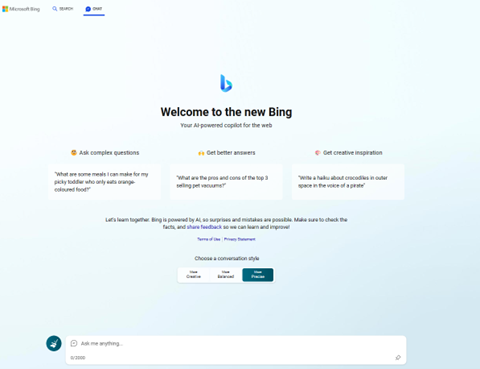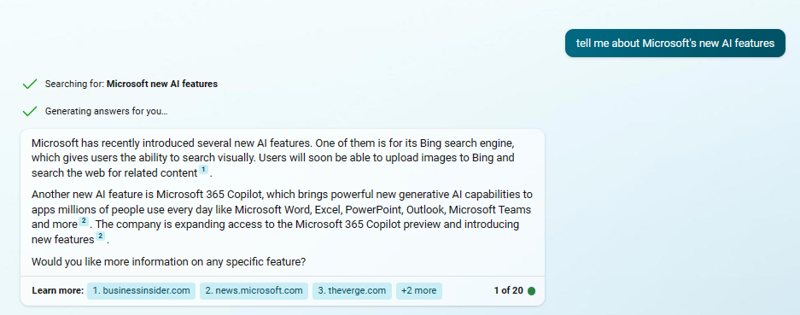The Quiet Microsoft AI Revolution
Nobody can deny that in 2023 ChatGPT has become the Wunderkind of the tech scene. And it’s not hard to see why. It’s clever, sophisticated, shows its own workings, boasts the latest in natural language processing technology, and perhaps most importantly... it's free and very easy to use.
But whether you think ChatGPT is the next big thing, the latest fad, or somewhere in between, there's another, potentially much more interesting AI revolution brewing. And it's all to do with Microsoft.
Microsoft’s Bing Chat Graduates to General Release
Early May 2023 saw the latest in a series of Microsoft AI-focused headlines after Microsoft announced the latest update to the OpenAI-powered Bing Chat. Described as a move to “the next generation of AI-powered Bing and Edge,” it is more of an extension of the tool introduced earlier this year. Now the waitlist has been removed, and users only need a Microsoft account to get started.
At the same time, new features were announced, including:
- A richer AI chat experience featuring charts, graphs, and updated formatting.
- Expansion of the Bing Image Creator to more than 100 languages.
Sure, these features aren’t ground-breaking in themselves and they’re certainly not going to propel Bing to ChatGPT levels of hype anytime soon. But they’re perhaps more interesting for what they say about the direction of travel than for any flashy new features you can use today. Because, the truth is, Microsoft has been quietly loading its chips all-in on AI for quite some time.
The Microsoft AI Revolution You’re Just Beginning to Hear About

Although Bing Chat might seem like a competitor to ChatGPT, in reality it’s more of an extension of it. Microsoft has been funding ChatGPT’s creator, OpenAI, since 2019, and has recently announced a further multiyear, multibillion-dollar investment.
Despite being basically the same technology, Bing Chat isn’t, as mentioned, likely to achieve its better-known counterpart’s rave levels of attention anytime soon. But really that’s beside the point. It’s much more interesting for what it says about how Microsoft sees the future of search, AI, and how we work.
The latest feature rollouts are part of a wider drive to integrate traditional search engines with the kind of AI-powered chatbot and content creation technology that the world has spent the last few months going so mad for. Or to be slightly cruder about it: ChatGPT is coming to your search engine.
And by no means is Microsoft being coy about its plan; the goal for Bing Chat is to ”reinvent the future of search” by becoming your ”copilot for the web.” Microsoft aims to resolve what it sees as a long-tolerated issue: ”that nearly half of all web searches go unanswered.” An easy shot to make, perhaps, when your chief competitor has an 85% market share in this space.
You only have to check out Microsoft’s Edge-based Bing Chat to get a glimpse of what this future looks like. Already, the boundaries between search and AI chat are blurring. Now AI-generated summaries appear alongside traditional webpage results, while Bing Chat offers citations and links to further reading. It’s a compelling proposition: simultaneously addressing AI’s perceived credibility issue (don’t believe us, follow the citation…) while reimagining search from the ground up.

View Full Size
Taken to its logical conclusion, search looks set to become a much richer, multimedia experience, combining voice and text search with AI’s ability to understand the searcher’s intent and curate whatever graphs, text, webpages, and videos can help fulfill it.
It’s a far cry from a traditional search engine, and it promises to be a much richer experience than even the AI-powered chatbots we’ve now become so accustomed to.
But here’s the thing: it’s not just about search. In fact, this is just one example of Microsoft’s big plans to incorporate OpenAI's technology into... well, pretty much everything.
A Flurry of AI Announcements
While ChatGPT loudly generates headlines, there's a perhaps more far-reaching change coming. And much of it comes, not from flashy new tools, but from implementing AI into existing solutions, platforms, and workflows. Before much longer, Microsoft’s banking on you using AI without your even really noticing it.
This new announcement from Microsoft is just the latest in an increasingly rich, often unflashy series of developments that aim to reimagine the way we work in the future. The goal is to bring AI technology into the everyday tasks, processes, and workflows we already use. As Microsoft CEO Satya Nadella himself said, “Every product of Microsoft will have some of the same AI capabilities to completely transform the product.”
And while Bing Chat is the most obvious example of this in action, it’s far from the only one. Here are just a few of the most recent developments.
Microsoft Viva AI
Microsoft Viva already provides a new experience by sourcing and compiling information and insights from around Microsoft 365 into Teams. To oversimplify, it turns Teams into something that looks a bit like a traditional intranet.
Now, AI promises to take this to the next level, with new features like Leadership Corner (aggregating posts, roundups, and announcements) and Answers in Viva (an AI-generated forum for employees to ask questions and surface helpful answers, context, or expertise).
More Than Just a Word Doc
The classic Office suite of Outlook, Word, PowerPoint, and Excel might not be your first choice for AI-focused modernization, but you’d be surprised at the potential. Recently, Microsoft announced a new feature, Copilot, to help users summarize emails, draft documents, and create slides.
Summarizing Microsoft Teams Calls
Another newly released feature promises to reimagine workplace meetings and collaborations in Teams. The Intelligent Meeting Recap creates an organized summary of key discussion points, action items, and decisions. The goal is to eliminate the need to take notes during meetings – a bold promise if they can fulfill it.
Microsoft’s Plan to Redefine the Future of Work

If you’ve been paying attention over the last twenty years or so, you’ll know the gap between what Microsoft says will be the next big thing vs. what actually becomes it is larger than they’d like (RIP Windows Phone).
And sure, in five years we may find ourselves as bemused by the Leadership Corner as we were by Windows 8 or the dreaded Clippy. But for better or worse, Microsoft is clearly adopting a policy of throwing AI at the wall and seeing what sticks. That, in itself, is pretty compelling.
There’s every chance that at some point soon, ChatGPT, like much that has been hyped before it, will become yesterday’s news. But by then, AI could be redefining everything from meetings to creating company decks and checking for errors in your spreadsheets. We may yet realize how transformative the most mundane changes can be.


